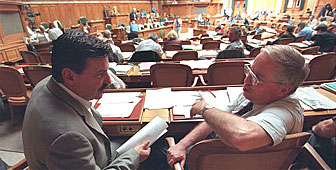Parliament speaks out for linguistic equality

Parliament winds up its summer session today, after three weeks of debate. Although politicians didn't see eye to eye on all the issues, they did try to make it easier for German, Italian and French members to better understand each other.
The motion in the House of Representatives calls for all documents to be distributed simultaneously to members of parliament in their own languages.
Papers in German, the language of the majority in Switzerland, are often handed out hours or even days before the French and Italian versions appear. Even though there is a simultaneous translation of the debates themselves, the French and Italian speakers feel at a great disadvantage compared to their German-speaking colleagues.
Supporters of the motion stressed that trying to make sense of German acronyms and technical terms was one of the main problems faced by French and Italian speakers. The motion also demands that all texts in future be written in gender-neutral language.
However, the language issue goes beyond discrimination of French and Italian in parliament. George Lüdi, a professor of linguistics at Basel University, told swissinfo that the vote on Thursday in the House of Representatives was meant to “guarantee that English will not overwhelm the national languages of Switzerland”.
“There’s a great concern on the part of the Italian-speaking minority to give Italian a better chance,” Lüdi said. “That doesn’t mean they don’t want to speak English, but their concern is to foster Italian.”
Lüdi likens the situation to that of the European Union, where there are 11 official languages: “For practical and economic reasons, it would probably be useful to have one official language. But for political reasons, it’s not possible. It’s the same problem in Switzerland. It’s absolutely unthinkable.”
swissinfo with agencies

In compliance with the JTI standards
More: SWI swissinfo.ch certified by the Journalism Trust Initiative
You can find an overview of ongoing debates with our journalists here. Please join us!
If you want to start a conversation about a topic raised in this article or want to report factual errors, email us at english@swissinfo.ch.